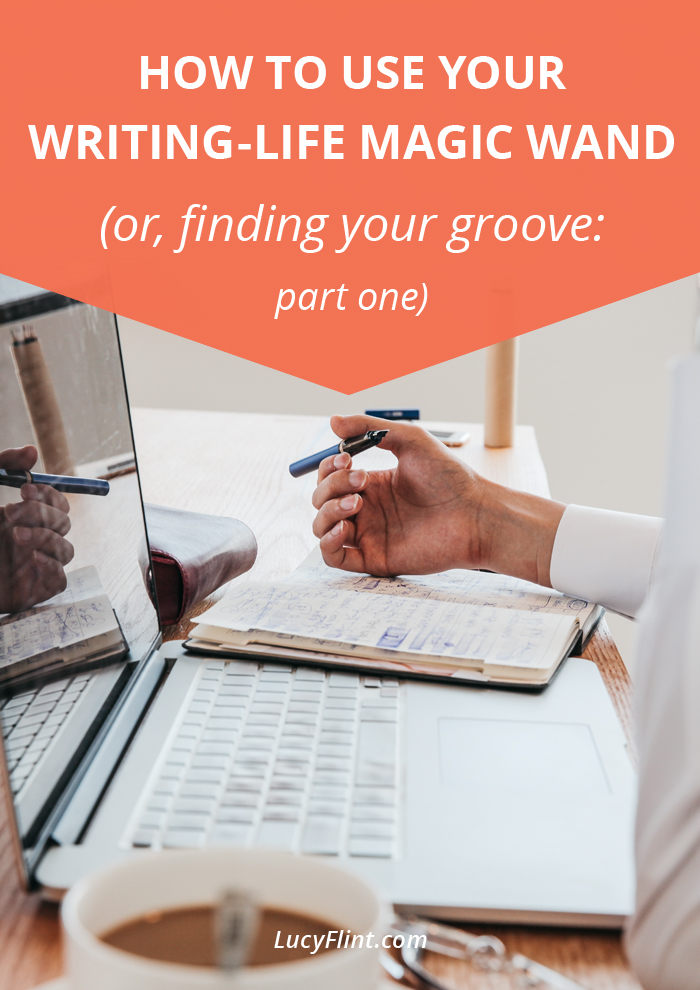How to Use Your Writing-Life Magic Wand (Or, Finding Your Groove, Part One.)
/Sometimes I am all about balance. I want to work in that exact rhythm of nurturing all parts of my life: getting good work done, but also seeing plenty of friends, discovering new places in the city, and being an all-around good citizen.
Sometimes, I do whatever I need to in order to stay right in balance.
And other times, I'm ready to help balance straight off a cliff.
There's this mad, maniac side of me that would really like to disappear completely from the world and drown myself in work.
Probably this is not very healthy.
But I've been thinking of it because I read Susan Branch's delightful memoir, Martha's Vineyard - Isle of Dreams. At one point, she describes how she began working on her very first cookbook—an intense project, because it featured not only her own recipes, but also watercolor illustrations on every page, and, bonus, she hand-lettered the entire book. ALL the text.
Mind = blown.
Her creative process was all-consuming. She started getting up at four or five in the morning, working all day in her pajamas, eating whatever came to hand while standing up in the kitchen. (Tater tots seemed to be a fave, which just makes me like her even more.)
And then back to work, and then early to bed, with her cats for company.
She was warning all us readers that this isn't especially wise, and isn't anywhere close to balanced, and that there are much better ways to live...
But, crazy me, I was reading that and thinking, That sounds WONDERFUL!
I mean, I can see what she means about quality of life over the long haul. Yeah, probably not a good place to stay for long ... but in short spurts, perhaps?
Because this is where I am, my friends.
I'm at that exact point in my creative process, where my deepest desire is to become a total hermit.
I've written too much about sustainability to believe this urge for long. And I've known burnout too well not to recognize the road that goes straight toward it. All this stuff about staying healthy and stable—it's legit, and I know it.
But still ... that little hermit-dream persists.
Which is what got me thinking: okay, okay, not a total maniac.
But what's the next best thing?
I got my answer by going back to one of my favorite books on creativity, Twyla Tharp's The Creative Habit.
Lemme read you her gorgeous description of a creative groove:
When you're in a groove, you're not spinning your wheels; you're moving forward in a straight and narrow path without pauses or hitches. You're unwavering, undeviating, and unparalleled in your purpose.
A groove is the best place in the world. It's where I strive to be, because when you're in it you have the freedom to explore, where everything you question leads you to new avenues and new routes, everything you touch miraculously touches something else and transforms it for the better.
Let's all just gaze at that with heart-eyes for a minute.
All right. If I can't be a total hermit right now, the next best thing I can do is generate a groove. Put myself in the sweetest of sweet spots with my work.
I want to be unwavering, undeviating, and unparallelled in my purpose. Yes, please!!
But according to Twyla Tharp, there are no guarantees with what will exactly work to launch someone into a groove. There's no exact formula. And dang it, I like exact formulas.
So I did some looking around at my favorite writing books. And I thought through what's happened around the grooves I've found in the past.
And I cobbled together all those things and figured out some characteristics, common traits that, if I pursue them hard enough, just might help shove me not off a cliff, but into a good, strong, writing groove.
And I'm EXCITED.
Because best practices like these are kinda like a magic wand. Wave 'em around long enough and hard enough, and I think some magic just might happen.
Maybe transformation.
And not into a raggedy bearded hermit, but maybe into the next best thing: A bright-eyed, rosy-cheeked, ink-stained novelist working her groove.
Want to come along? Cool. Because unlike the hermit, I don't mind a bit of company.
(Oh, and this will be a two-parter, so check back in two weeks for the second half of our groove-making work. Perfect.)
1: Save your environment.
Where do we begin? With the stuff that's right in front of us: Our place, our time, our space. Our work environment.
Because the first thing we need to do if we want a groove is make room for it.
What kind of space, what kind of schedule, what kind of environment, would help you to write the most deeply and consistently? What would let your imagination have the freedom, space, and support, to just run wild?
Oooh.
This might mean adding in more beauty, comfort, or quirkiness to your writing space. (Never underestimate the power of quirk.)
It might mean adding encouraging messages and reminders around your desk. Putting pep talks on Post-Its, and sticking 'em to your computer screen.
Or, maybe it means you need a blank slate, go minimal, pare everything down til it's clean and spare and fresh.
What would help you go deeper into your work?
The other half of this question is: How does your time look?
What is the best time of day for you to work? How long of a writing session feels optimal to you?
I've had months where the yummiest writing work got done between 11 p.m. and 1 a.m., and I just went with it.
Now I'm on the other side of the spectrum—for some reason, waking up at 5:30 a.m. gives me such a sense of expanse and freedom and clarity that I dive into my days feeling full of promise. (And okay, maybe planning a nap later, but nevertheless.)
When is it best for you to write? Not for other writers, not for other people—when is it best for you? When do all your creative juices get going, and when do you feel that release from other obligations?
Speaking of obligations: You're already heard me say this, but I'm gonna say it again. One of my favorite practices is clearing out commitments. No, this isn't easy. Yes, you might feel like you're stepping on other people's toes.
But it is so helpful to do this from time to time. Check out everything you've been participating in, and if something is draining you more than it's feeding you, give it a very stern look.
And see if you can get out of it. If not, try to soften it, or lessen the impact of it in some way.
This could be something as tiny as unsubscribing from an email newsletter that's stopped being helpful. Or it might be stepping back from some small weekly thing you've been doing for a while. Or you might turn down a bigger commitment that you've been having second thoughts about for a while. This is the time for it to go.
You need to free up that creative energy, my friend!
So cancel some things, take a good look at what writing times work the best for you, and give your space a good sweep.
... I think that writing groove just moved a whole lot closer.
(If you want some more cheerleading or ideas for how to do this, check out these three posts to build a "moat," lighten your load, and shake up your space.)
2: Build a food pyramid.
It is really hard to work in a groove if all your wells have run dry.
There's no way to sustain continual, deep, yummy work if you have nothing to draw from, nothing to paint with. If your imagination has shut off, gone cold. That's the way to get into a rut or a block, not a groove.
Which is why it's worth figuring out a good, reliable answer to this question:
How can I continually feed my imagination what it needs?
What kinds of things do I need to take in on a regular basis, for my creativity to be strong and ready for anything?
This is one of those habits that is ESSENTIAL to working well and working sustainably. It's also one of the first things I cut.
(This is why you hear me say the same things over and over, y'all. I have to keep re-learning these lessons myself!)
Feeding the imagination is one of those vital but seemingly unimportant skills. And in order to get into a good, rich groove and stay there, we have to find ways to keep the nutrition flowing in.
So: what do you need?
For my imagination to thrive, I need it stocked with a lot of odd fascinating facts that don't necessarily have a place in my immediate writing.
That's why I'm smitten with the randomness of dictionaries and encyclopedias, why I swoon over amazing, comprehensive wonder-sites like Atlas Obscura. It's why I need to keep reading widely, why I have to keep learning.
Because all those little images and facts and tidbits and impressions and shards of atmosphere and tiny details—they're all the building blocks of what we make, right? They're what we invent from.
They're like the amino acids of the creative process. They're essential.
Last fall, I ran out of steam, out of juice, out of everything. So I blocked off a whole month for a sabbatical. The goal? To stop all output, and focus only on input. Getting those amino acid levels up again.
So I thought about what my imagination and my writerly heart were most craving, and I drew myself a little food pyramid of what I most needed.
At the bottom? Books, books, and more books. I wanted to read a ton of fiction, but also some really yummy non-fiction, and on top of that, some of my favorite reference books.
Then I also wanted to see movies that would capture my excitement, as well as gorgeous documentaries (I am so not over Chef's Table, btw).
And then I wanted to watch a bunch of TED talks, I wanted to do a lot of painting and art-making, and I wanted to watch and read interviews with other makers—not just writers, but calligraphers and musicians and anyone who does any kind of art.
That was my pyramid: what's yours?
What do you need an enormous amount of right now? Give yourself permission to take it in. Maybe you need a bunch of creative, stimulating, exciting outings. Maybe you need to take a lot of pictures, or visit an art store and then get paint in your hair.
Or maybe you need to make a ton of tea and grab a stack of library books and just get lost in pages for a while.
Or maybe the thing you most need is actually silence.
Listen in. See what you're saying, down deep. And then go after it.
(Want a few more ideas for nourishment? Maybe give yourself a distraction detox, go looking for wonder, or take a revolutionary writing pilgrimage.)
3: Apprentice yourself to a master magician.
One of the qualities of a good writing groove is that you can solve the problems that arise without too much bleeding.
You know what I mean? Sure, you'll hit an obstacle, but you're all warmed up and ready to tackle it, and you find inventive solutions.
The more flexible our skills are, and the more skills we have at our disposal, the more likely we are to find ourselves working from an excellent groove.
Without craft and skill, the wheels will keep coming off, and we'll get stuck.
In The Creative Habit, Twyla Tharp tells how she found herself in a mega-groove of choreographing one excellent dance piece after another.
What triggered it? A leap forward in her skill as a choreographer.
Through inventing one piece with a specific kind of style, she learned an entirely new dance vocabulary. And that breakthrough unlocked so many possibilities that the next several dances came together with a special wonderfulness.
This makes total sense, right? When we get better at the raw skills of what we do, everything gets a little easier. We're more flexible, quicker at solving problems, and we can reach for more creative solutions.
Everything clicks along more happily.
So where do you want to give yourself a skill upgrade? Where would you appreciate a mini-class, a workbook session or two, or just some solid time practicing?
Who do you want to learn from? What's the next step in your apprenticeship?
For me, it's learning story structure in a deeper and deeper way. I've been hard at work on all things Story Grid, listening to the podcast and applying it to my draft. (Whew! So much good stuff to learn!!) I'm especially working on shaping scenes. ... I want to become a scene NINJA. Seriously.
What does that look like for you?
(If you want more craft and skill pointers, check out these posts on escaping miniature writing ruts, tiny craft improvements, and creating your own master class.
And then, if you want to get REAL serious about learning from the best, raise your noveling skills to epic status by checking out the resources here, here, and here.)
4: Put on your workout clothes.
Here we go: The most glamorous groove-inducing method of all.
Hard work.
Sweat.
A run-a-marathon level of effort.
(Paired with rewards, kindness, naps, and dance parties, of course! I promise I haven't forgotten sustainability already!)
True story: sometimes a groove has to be earned.
Like one of those "buy 9 cups of coffee, get the 10th free" cards that I treasured in college: sometimes you have to put in a lot of effort before you get the free stuff.
Sometimes it takes me two weeks of super hard work, slogging straight up hill, yowling the whole way. And then, suddenly, momentum kicks in, and I'm sailing along.
If you've ever done Nanowrimo and found a real sweet undertow pulling you along late in the process: you've experienced this too.
This is the power of the marathon mindset. Having that keep moving mindset can vault you over so many obstacles—through sheer momentum.
Let me tell you: momentum can be your best friend.
The best thing about this one is that you can create a marathon on your own. Hard work is totally free. All it costs you is time and sweat.
You don't need Nanowrimo to come knocking, and you don't need a special event or a class.
All you need is a target of words (or exercises completed, or pages written) and some kind of deadline (just to spur you on—and to let you know when you get a big break!).
Maybe it's a full draft in 6 weeks, or 50,000 words in 30 days, or it could be 366 10-minute exercises in 8 weeks (what can I say, it was fun!).
The things that make a marathon rewarding and valuable for me (as opposed to miserable and burnout-inducing) are:
maintaining a tone of utter kindness;
focusing on the quantity of work instead of nitpicking about the quality;
and just keeping myself entertained in the words.
If I hold to those three things, a writing marathon becomes my best friend.
So give it a try. What kind of parameters could you put in place to let loose a hard work marathon in your writing life? And ooh, what might it catapult you into?
Make yourself a fun chart (or am I the only one who thinks the graph is one of the best parts of Nanowrimo?), set up some lovely rewards for yourself, and dive in.
(Want a little bit more of a push before committing to a marathon? You've got it. Check out my best stuff on the Nanowrimo mindset—here and here—plus dealing with marathon-level fear, and keeping your body happy while you write so much.
... Plus one more post on the delirious, let's-all-sing-sea-chanties word drunkenness that happens mid-marathon. Yup.
This is why I'm telling you that hard work doesn't have to be miserable: it can be incredibly blissful as well. And it can be easier to keep writing than it is to stop... and that's exactly where I want to get to again!)
And there you have it: four of my best tools for launching myself into a better writing rhythm and a deep writing groove.
Whew!! I'm excited to dive in and apply the heck out of all four of these things. Thanks for staving off total hermit syndrome with me. Seriously, it was about to get real weird here. ;)
Check back in two weeks for the second half of the post... and till then, good luck finding your groove. Go make some magic.















